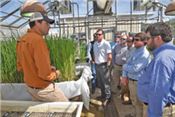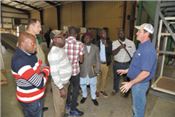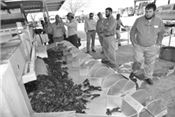|
AgCenter Rice Station Hosts Leadership Class, African Visitors
CROWLEY, LA.
The LSU AgCenter H. Rouse Caffey Rice Research Station hosted two agricultural groups on March 28.
The Rice Leadership Development Class made its annual tour of the station, and a group of 11 Africans also visited the facility.
Steve Linscombe, retired director of the AgCenter Rice Research Station, let the Rice Leadership class. This was the group’s first of several tours of rice-growing regions in the U.S.
“This is an outstanding group of young representatives of the U.S. rice industry with class members from Louisiana, Arkansas, Mississippi and Missouri. These young men over the next two years will learn the rice industry from A to Z,” Linscombe said.
The class attended a crawfish boil at the Richard farm near Indian Bayou. During that meeting, rice industry leaders recognized the work of Mary Jemison upon her retirement from USA Rice.
At the Rice Research Station, the class heard about the breeding work of Adam Famoso to develop new rice varieties, and Don Groth, resident coordinator of the station, gave an overview of the research there.
The group also visited the JohnPac bag manufacturing plant in Crowley and area rice mills. They also heard about crawfish at the Zaunbrecher brothers farm near Crowley before traveling to New Orleans to see grain shipping facilities on the Mississippi River.
Two Louisiana men – Justin Nix, of Maurice, and Michael Durand, of St. Martinville – are in the leadership class. Others are Austin Littleton, of Missouri; Matthew Morris, of Arkansas; and Austin Davis, Bobby Golden and Jason Bond, all of Mississippi. Bond, an agronomist with Mississippi State University, previously worked at the AgCenter Rice Research Station.
Ben Mosely, USA Rice vice president for government affairs, joined the group on this tour.
AgCenter horticulture professor David Picha brought a contingent of Africans to the Rice Research Station. They included government employees, farmers and professors from Tanzania, Malawi, Nigeria, Kenya and Rwanda.
The visitors were interested in finding out more about the post-harvest practices at the Rice Research Station, including storage and management of temperature and diseases.
The Africans met with Rick Zaunbrecher, director of the AgCenter Foundation Rice Seed Program to learn how rice is cleaned of debris, and Groth briefed the group on research conducted at the station and rice-growing practices in Louisiana.
The tour also included visits to the Thibodeaux farm near Morse and federal grain inspection facilities. During their two-week visit to the U.S., the Africans also will tour agricultural facilities in California.
A considerable amount of food in Africa is lost to diseases and insects after harvest.
“They lose about 30 percent of their grain, fruits and vegetables,” Picha said.
Agricultural infrastructure is lacking in Africa to protect their harvested crops. “To reduce just 1 percent of post-harvest loss would be significant,” Picha said.
The African tour was funded by the U.S. Department of Agriculture. ∆

Adam Famoso, far left, LSU AgCenter rice breeder, tells the USA Rice Leadership
Development Class about the procedures used to develop new rice varieties.
Photos by Bruce Schultz/LSU AgCenter

Rick Zaunbrecher, far right, manager of the foundation seed program at the
LSU AgCenter H. Rouse Caffey Rice Research Station, tells a group of Africans
about the station’s grain storage facilities.

Members of the USA Rice Leadership Development Class watch a crawfish grader
in action at the Zaunbrecher farm as it separates the crawfish according to their sizes.
|
|